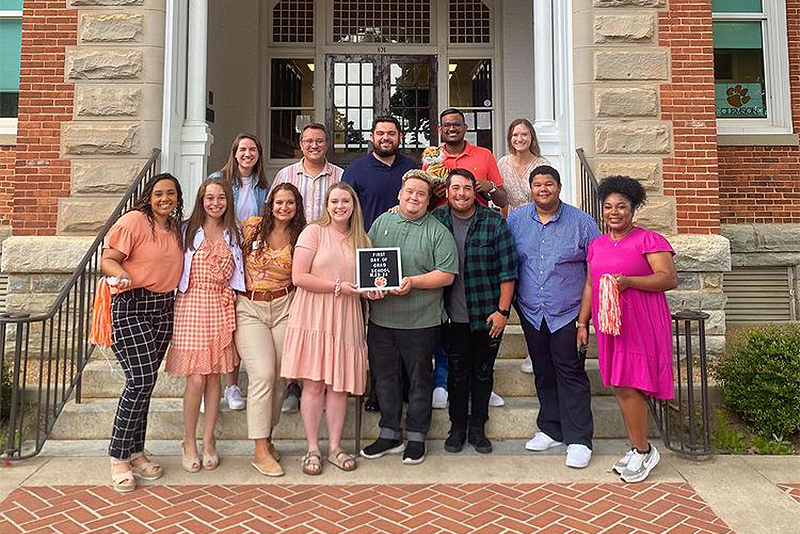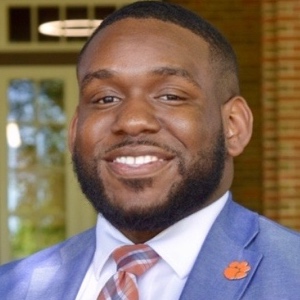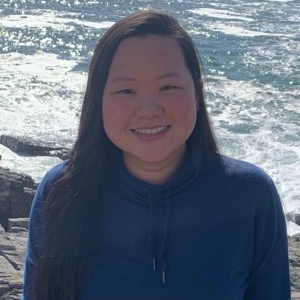-
Academics
- Academics Overview
-
Undergraduate
- Undergraduate Overview
- Agricultural Education
- Early Childhood Education, B.A.
- Elementary Education, B.A.
- Middle Level Education, B.S.
- Mathematics Teaching, B.S.
- Modern Languages Education, B.A.
- Special Education, B.A.
- Secondary Education, B.A.
- Science Teaching, B.S./B.A.
- Athletic Leadership Minor
- Human Capital Education and Development
-
Master's and Specialist Programs
- Master's and Specialist Programs Overview
- Athletic Leadership (Online)
- Counselor Education
- Educational Leadership
- Human Resource Development
- Learning Sciences
- Literacy (Online)
- Middle Level Education, MAT
- Modern Languages, MAT
- Secondary Education, MAT
- Special Education (Online)
- Student Affairs
- Teaching and Learning (Online)
- Teaching and Learning, Ed.S.
- Doctoral Programs
- Certificates | Endorsements | Licensure
- Expressway to Tiger Town
- Bachelor's To Master's | Teacher Residency
- Teaching Fellows
- Research
- Programs
- Students
- About
Student Affairs, M.Ed.

The Master of Education in Student Affairs program provides students with a transformative learning experience founded on theory-to-practice. In producing practitioner-scholars, the faculty combine in-class learning with graduate assistantships / full-time employment enhanced with practicum and internship experiences. The program’s strong network of alumni help foster connections across the field and in and beyond the region. Students graduate prepared to successfully support students with strong collaboration, leadership, and communication skills based in theory and ethical practice.
-
Overview
The M.Ed. Program in Student Affairs at Clemson University is designed to produce practitioner-scholars with skills to work in any student affairs or student support functional area. This program highlights the ways that student affairs and academic affairs complement one another in recruiting, admitting, supporting, developing, retaining, and graduating students. The student affairs program curriculum is mapped to the ACPA / NASPA professional competencies.
Our work and learning together centers students and contributes to higher education in a variety of ways, in a broad range of positions, and in diverse institutional settings. Ultimately, students in our program learn how divisions of student affairs function as interconnected working units, and how divisions of student affairs complement the academic mission of institutions and enhance student learning in higher education.
In our program we hope to prepare:
- Informed practitioners who apply research and scholarship to individual contexts and broader learning environments.
- Active practitioners who engage in service and professional development at the campus, local, state, regional, and national levels.
- Introspective practitioners who make ethical and critical decisions in pursuit of just and equitable experiences and environments.
- Collaborative practitioners who create, implement, and support equitable opportunities and environments to address emerging issues in community with others.
-
Program Goals
Students in this program can expect:
- a curriculum aligned with the ACPA/NASPA Professional Competencies
- graduate assistantships and field experiences selected by the students and their advisors enhancing students’ professional interests
- professional development opportunities through graduate student organizations, professional conferences, and leadership opportunities
- a learning experienced informed by the cohort model which brings together students from varied backgrounds and identifies and informs the learning in and out of the classroom
- an immersive learning environment that develops practitioners ready to engage in student and academic affairs work, informed by courses, projects, individual and group projects, student involvement, and field experiences
Program Evaluation Data
Each year, the program conducts an exit survey that assesses recent graduates' learning outcomes and perceptions of program experiences. Consistently, over the past several years, recent graduates have noted they appreciate the following components of Clemson's program:- Student-centered faculty who get to know students as individuals
- The ability to work with their faculty advisor to design a unique course of study that furthers their professional goals
- The rich variety of functional areas and institutional settings for practicum and internship experiences
- A strong program alumni network connecting students with prospective employers
- Collaboration between the student affairs M.Ed. program and the Clemson University Division of Student Affairs, which facilitates learning in and out of the classroom
- Recognition of the program by student affairs practitioners around the country
- The high job placement rate of the program and the assistance they receive from the faculty to effectively search for, acquire and transition into their first professional position.
-
Admission Requirements
Admission to the Program
The Counselor Education-Student Affairs master’s program admits students for a fall (full-time students) or spring (part-time students currently working in higher education) entrance terms. Only complete applications are considered for admission. Please note that academic admission does not guarantee acceptance into the program. You must also secure a graduate assistantship or be employed full time in a higher education setting.Application Deadlines
- January 1, for full-time students to enroll in the fall semester
- Final decisions are typically made by mid-February
- October 1, for part-time students already working in Higher Education to enroll in the spring semester
- Final decisions are typically made by mid-October
Application Requirements
To be considered for the Program, applicants must:
- Have a bachelor’s degree with a minimum GPA of 3.0 on a 4.0 scale
- Secure a graduate assistantship position at Clemson or full-time employment in a higher education setting
- The graduate assistantship process is separate from academic admissions. Please visit the Graduate Assistant Recruitment and Selection (CU-GARS) website for more information.
- Submit an online Graduate School application which requires:
- Unofficial transcripts (official transcripts will be required if you are accepted into the program)
- Current resume
- Two recommendation forms
- Recommendation forms are emailed directly to recommenders via the online application process
- Forms should be completed by individuals able to speak to your ability to be successful in graduate-level work
- Four short essay responses
- Prompts included in application
Student Affairs Assistantships
Full-time students are required to be employed full-time or to have a graduate assistantship in order to be in the program. The program is designed this way to emphasize the theory to practice philosophy of student affairs work. Graduate assistantships are competitive and are typically obtained through the Clemson University Graduate Admissions Recruitment and Selection CUGARS process. Because the size of each cohort is determined by (a) available assistantships and (b) faculty capacity, applicants who do not receive an assistantship with Clemson University or who are not full-time employees in higher education settings will NOT have a space in the cohort.NOTE: This program is listed on the Graduate School application as Counselor Education (Student Affairs).
- January 1, for full-time students to enroll in the fall semester
-
Tips for Applying
The student affairs program faculty seeks to admit a diverse cohort from the applicant pool for this competitive program, thus we review applicant files comprehensively. With that in mind, the faculty look for the following when reviewing applications:
- The potential for student success in graduate school. This can be exemplified by past academic success (GPA), but enhanced by strong letters of reference from former faculty on the likelihood of students’ success in graduate learning and education.
- Strong collaboration and communication skills. Much of the program at Clemson is based on teamwork and group projects. This is intentional in order to prepare students to be successful student affairs practitioners. Students should be prepared to provide examples in their materials of how they have worked on teams, communicated effectively, and navigated conflict.
- Experience with and desire to continue learning about justice and equity. Because we seek diverse student perspectives, student experiences and familiarity with issues of justice and equity enhance the learning / teaching faculty, individual students, and cohorts can do in the program. Speaking about personally transformative experiences related to these topics helps faculty understand potential student contributions and opportunities for additional learning.
- Student affairs knowledge. While we do not expect students to come in with full understanding of the complexities or variety of functional areas within student affairs, students should bring some familiarity with the profession and current issues related to student affairs work into their learning.
Applicants will have a chance to speak to these and other topics in the application essays. We encourage you to give thought and a high level of effort to these essays as they are your chance to tell us who you are. Essay responses that are superficial, contain basic writing errors (grammar, spelling, etc.) significantly reduce the likelihood that a student will receive admission from the faculty to the program. We encourage students to have others review their writing for both content and mechanics before submitting the essay responses.
-
Program Requirements
Student Affairs Master of Education (42 semester hours)
Core specialization courses (33 hours):
EDSA 8030 – Student Development Services in Higher Education
EDSA 8040 – Theories of Student Development in Higher Education
EDSA 8060 – Student Affairs Issues
EDSA 8080 – Legal and Ethical Issues in Student Affairs and Counselor Education
EDSA 8090 – Higher Education Administration
EDSA 8100 – Advising and Supporting
EDSA 8110 – Social Justice
EDSA 8190 – Contemporary College Student
EDL 7650 – Assessment and Evaluation in Higher Education
EDL 8550 – Applied Research in Higher Education
EDL 9770 – Diversity Issues in Higher EducationField Experiences (6 or 9 hours):
EDSA 8340 – Student Affairs Practicum (prerequisite 8030 or 8040 and permission of instructor)
EDSA 8440 – Student Affairs Internship (prerequisite 8340 and permission of instructor)Elective (in lieu of second internship as outlined below)
Students must complete both a practicum and an internship experience. Students may opt for a second internship or may instead choose an elective course. The elective course must be at the graduate level and chosen in consultation with a student’s advisor.
The full-time program can be completed in two years. Most full-time employees are able to complete the program in three years. All students must complete the program in six years. Courses are primarily taught late afternoons and evenings, Monday through Thursday, at 3:30 or later. Most courses are taught at Clemson University.
-
Financial Information
Tuition and Fees
Explore information on tuition and fees using the Student Financial Services’ tuition and fee calculator.Financial Aid
For information regarding financial aid, please contact the office of Student Financial Aid.Graduate Assistantships
Graduate Assistantship positions exist across the University in a variety of departments and centers that enhance and complement the academic experience students receive in the classroom.Assistantships are available to full-time students (enrolled in at least nine credit hours per semester) and typically require a 30-hour per week work commitment. The work assignments vary by assistantship. Students who obtain these positions will receive an extensive tuition reduction as well as a monthly stipend.
Candidates for the Master of Education in Student Affairs program may submit applications for Graduate Assistantships starting in mid-November. Applications are due no later than February 1. The assistantship application is separate from the February 1 Graduate School application.
Once candidates are admitted to the graduate program, they will be invited to participate in the on-campus interview days during which admitted students will interview with departments seeking graduate assistants. The two-day process allows candidates to meet other candidates, faculty, staff, and current students while they learn about Clemson University and the Master of Education Student Affairs program.
At the end of the interview process, candidates rank their assistantship opportunities. These rankings will assist in identifying candidates for each position. Candidates receiving an offer will have until April 15 to make a final decision.
For more information or to apply for an assistantship, please visit the Graduate Assistant Recruitment and Selection (CU-GARS) website.
-
Our Students
Our students bring a variety of personal, academic, and professional experiences with them to Clemson. While many come into the program directly from their undergraduate institutions, others work and then return to school full time, while still others continue to work full time as they complete their degree. Their experiences at diverse institutions as undergraduates as well as in their varied jobs and assistantships make the learning deeper and richer in the program.
Additionally, the Student Affairs program faculty encourages students to be involved outside of the classroom and therefore supports the following organizations:
Student Personnel Association (SPA)
SPA is open to all graduate students in the Student Affairs program as well as student affairs practitioners and Ph.D. students interested in student affairs.Chi Sigma Alpha – Edward Grandpre Chapter
Chi Sigma Alpha is an honorary society for student affairs graduate students and practitioners to which one must apply and be accepted.Student Peer Mentor (SPM)
Student Peer Mentors are current students who engage with and sometimes host potential students who are interested in the Student Affairs M.Ed. program at Clemson University. -
Information Sessions & Calendar
Review our College of Education Graduate Calendar to view upcoming events and information sessions.
-
Find Out More
For more information regarding the program or questions associated with applying to the program, please contact Ashley Vaughan at avaugha@clemson.edu.
“This program has equipped me with the knowledge and confidence to do the work to help make higher education not only a quality learning environment for students, but also an environment that is equitable and inclusive for people of all backgrounds and identities. Additionally, this program has opened my eyes to the multiple avenues within higher education. Perhaps the biggest impact were the opportunities to conduct research alongside our faculty. These opportunities, in addition to in class experiences, introduced me to the scholarly side of higher education and prompted my interest in pursuing my doctoral degree and eventually the professoriate.”
Dion T. HarryAcademic AdvisorGeneral Engineering Advising Center
“Clemson’s higher education program was a life changing experience for me and my time in the program has both made me a competitive candidate while job searching but also helped me become a more well rounded individual. The intense focus on the practical experience via internships and practicums during my program experience helped me explore multiple facets of student affairs such as residential life and multicultural affairs but also afforded me the opportunity to dabble in academic affairs such as academic advising and support and academic integrity. This program provided me the foundational knowledge I needed to start my career but also helped scaffold my experience via hands on learning.”
Wen XiResidence DirectorPace University-Pleasantville


